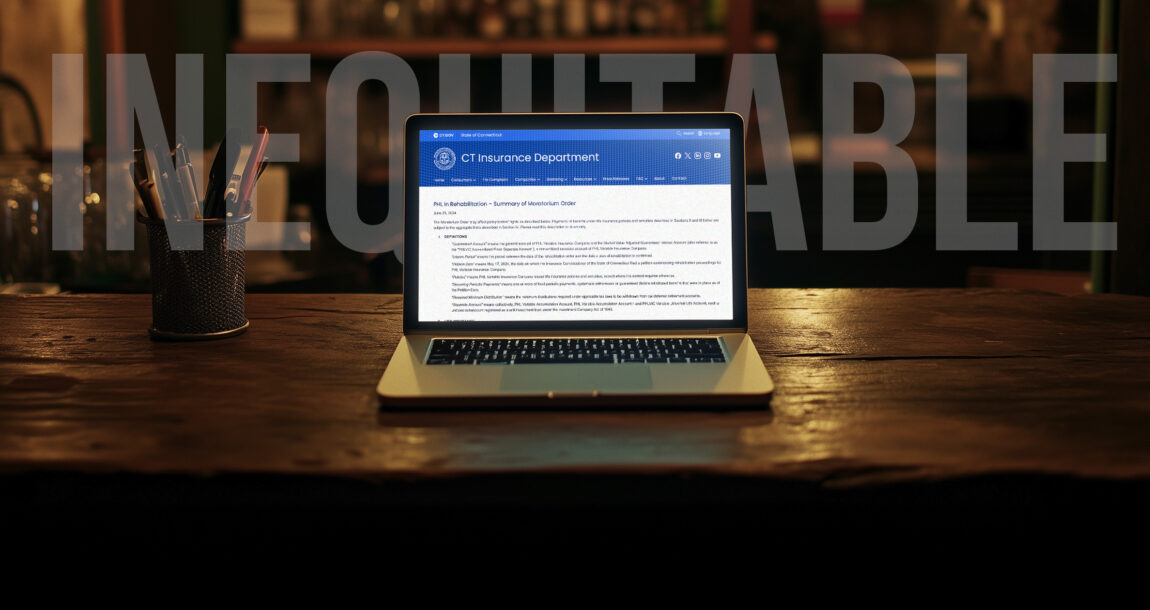PHL Variable policyholders: moratorium on policy benefits ‘inequitable’

A pair of PHL Variable Insurance Co. policyholders are asking a Connecticut court to reconsider a $300,000 moratorium on benefits created by the Department of Insurance.
Dana Montana and Dennis DeGori filed a motion to intervene Friday with the Superior Court for the Judicial District of Hartford. Both own Phoenix Protector Universal Life II policies with death benefits well in excess of the $300,000 limit.
In May 2024, Insurance Commissioner Andrew Mais introduced the moratorium on benefits payments until a Connecticut court approves a rehabilitation plan for the financially troubled PHL Variable.
Montana and DeGori called the moratorium, “an escalating inequality.”
“Individuals with a death benefit below $300,000 suffer none of the consequences of the injunctive order while [Montana and DeGori] suffer a very significant diminution in their benefit,” the motion reads. “This inequity is made worse as those policies that paid in the most and have the least to do with the insolvency will suffer the most.”
The CID sent the following statement to InsuranceNewsNet: “The Connecticut Insurance Department is not commenting on pending litigation before the court."
PHL and its subsidiaries, Concord Re, Inc., and Palisado Re, Inc., were placed into rehabilitation on May 20, 2024, by a state superior court judge after several financial setbacks.
PHL issued life insurance and annuity products and related supplemental contracts to policyholders nationwide. Concord and Palisado are captive insurers whose only business is the reinsurance of PHL’s liabilities.
Mais filed the petition to put the companies into rehabilitation after determining that they were in a hazardous financial condition and that other alternatives had been exhausted.
The Montana/DeGori motion is the second motion to intervene received by the court. In December, a group of investors owed more than $40 million in combined benefits from several PHL Variable policies filed a similar motion. Those plaintiffs are concerned about "setoff rights," in this case the right to use unpaid benefits to satisfy premium owed.
CID rejected any setoff rights in the PHL Variable case, their motion notes.
Policies support investment
Montana and DeGori are co-owners of Stone Park Entertainment, described in court documents from a previous lawsuit as a Stone Park, Illinois corporation and home to Scores, an "adult entertainment establishment."
Montana, 82, purchased her policy on Oct. 15, 2004, the motion says. Her death benefit is $6 million and her monthly premium is $9,943. The cash surrender value of her policy is "in excess of $800,000," the motion states, with Stone Park Entertainment as the beneficiary. DeGori holds a policy with a death benefit of $4 million.
"Montana and DeGori each purchased policies with PHL as an instrument to purchase the other's interest in Stone Park," the motion reads.
The policyholders want the moratorium order amended "to address the varying classes of policies," the motion says. "[The] Rehabilitator fails to consider the value of different policy types, the cash value of various policies, and the varying amounts of payments policyholders are required to make to obtain the same $300,000 of coverage."
PHL deficit grows
On Nov. 20, 2024, CID released its first accounting and status report on PHL rehabilitation efforts. Regulators subsequently answered questions posed by InsuranceNewsNet in December.
The report identified an "aggregate capital and surplus deficiency [of] $2.1 billion, substantially higher than the $900 million deficiency outlined in the original petition," the motion notes.
CID expects to present "the key terms" of a rehabilitation plan by mid-2025, Jane Callanan, general counsel, told InsuranceNewsNet. A complete plan of rehabilitation would be filed thereafter, with the plan confirmation process "likely in late 2025."
Montana and DeGori expressed frustrations at the uncertainty.
"The [status] report cautions that the rehabilitation plan will not necessarily provide for payment of all benefits due under policies and may require policyholders to accept policy modifications or buyouts," the motion reads. "The Rehabilitator cannot say for certain at this point whether all policy benefits will be paid, despite policyholders paying the same premiums that they have always had to pay."
The motion further noted that agents and other producers who sold PHL policies continue to be paid commissions because CID determined it "is in the best interest of the companies and PHL policyholders."
© Entire contents copyright 2025 by InsuranceNewsNet.com Inc. All rights reserved. No part of this article may be reprinted without the expressed written consent from InsuranceNewsNet.com.
InsuranceNewsNet Senior Editor John Hilton has covered business and other beats in more than 20 years of daily journalism. John may be reached at [email protected]. Follow him on Twitter @INNJohnH.






How to identify ideal prospects for long-term-care insurance
Health care impacted by cybersecurity, regulation and AI in 2025
Advisor News
- LTC: A critical component of retirement planning
- Middle-class households face worsening cost pressures
- Metlife study finds less than half of US workforce holistically healthy
- Invigorating client relationships with AI coaching
- SEC: Get-rich-quick influencer Tai Lopez was running a Ponzi scam
More Advisor NewsAnnuity News
- Trademark Application for “EMPOWER MY WEALTH” Filed by Great-West Life & Annuity Insurance Company: Great-West Life & Annuity Insurance Company
- Conning says insurers’ success in 2026 will depend on ‘strategic adaptation’
- The structural rise of structured products
- How next-gen pricing tech can help insurers offer better annuity products
- Continental General Acquires Block of Life Insurance, Annuity and Health Policies from State Guaranty Associations
More Annuity NewsHealth/Employee Benefits News
- NC Medicaid leaders seek new funding strategy as work rules loom
- Researchers to study universal health care, as Coloradans face $1 billion in medical debt
- Study Findings on Chronic Pain Are Outlined in Reports from Brody School of Medicine at East Carolina University (Associations of Source and Continuity of Private Health Insurance with Prevalence of Chronic Pain among US Adults): Musculoskeletal Diseases and Conditions – Chronic Pain
- As health insurance costs rise, locals confront impacts
- Plainfield, Vermont Man Sentenced to 2 Years of Probation for Social Security Disability Fraud
More Health/Employee Benefits NewsLife Insurance News